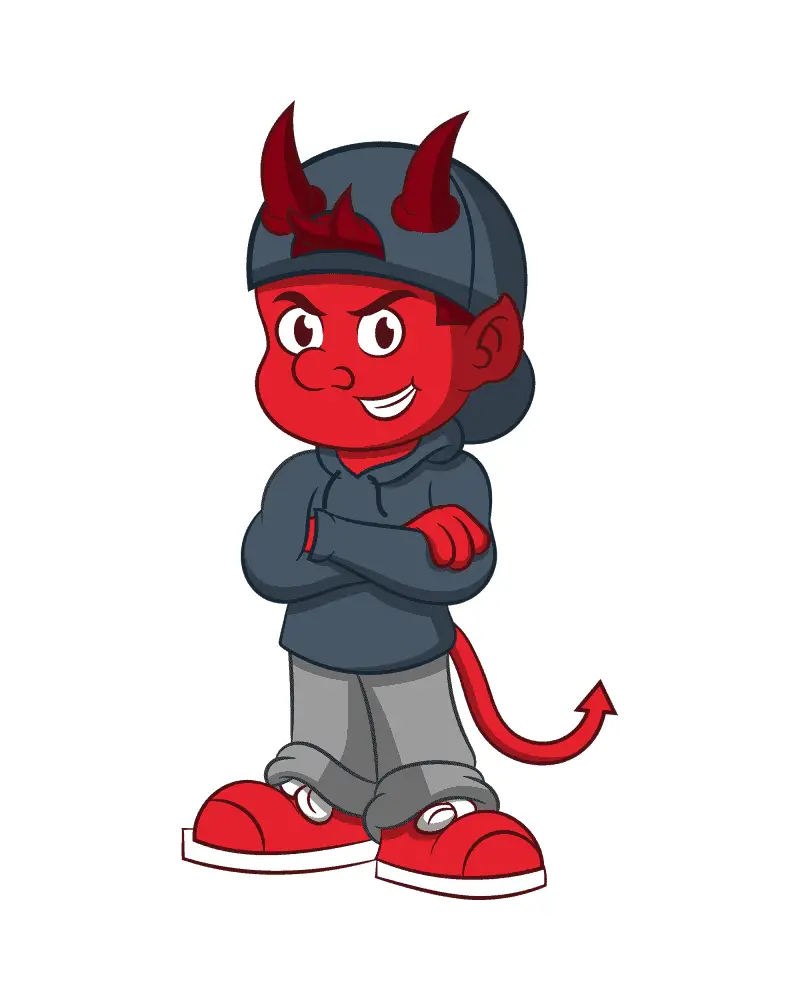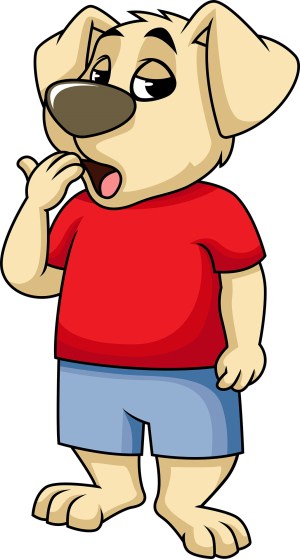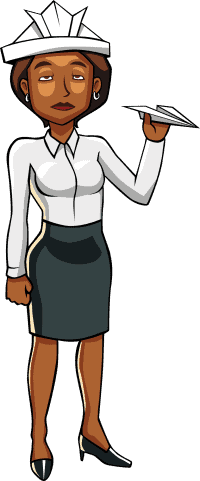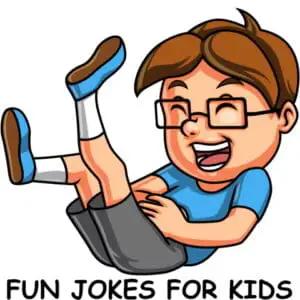Movies with good guys versus bad guys are tried and true, usually easily recognizable for kids. However, when it comes to good humor versus bad humor, for kids, it’s not been so clear. Let’s look at what parents and teachers need to be aware of when it comes especially to bad humor targeting kids today.
Bad humor is prevalent in children’s entertainment, only it’s not always obvious or intentional. From humor that’s too mature or over kids’ heads to humor that’s just not funny or quality material, parents and teachers have to be vigilant against bad humor in kids’ movies, TV shows, and cartoons.

Being a mom of four, now an ‘Oma’ too, as well as having a teacher background, I’ve become quite the expert in vetting kid entertainment. And I’ve learned over the years that just because it looks ‘made for kids’ doesn’t mean it’s good for them.
Read on as I explain the ins and outs of bad humor as it relates to children’s movies and TV shows, as well as provide some tips and suggestions to help you navigate the wide-range of what’s targeting our most precious charges.
Contents
What is meant by bad humor?
Let’s first address what’s actually meant by bad humor. What’s bad about it?
Bad humor often means humor that’s inappropriate, crude, rude, sexual, or very mature-themed. It’s akin to dark or black comedy. Then again, bad humor can mean humor that’s just not funny. It also can describe someone’s grumpy mood. Context is needed to get the pertinent or intended meaning.
Bad Humor Refers to Inappropriate, i.e. ‘Bad’, Themes
The meaning of bad humor as inappropriate or mature themed is definitely the kind of humor parents and teachers need to watch for. Dark humor, aka ‘bad humor, has infiltrated so much of children’s entertainment that it’s hardly noticed except in the extreme. Even then, adults often overlook it thinking that kids won’t understand it so then it’s not anything to worry about.
Types of bad humor are jokes that have sexual references; racism/sexism/ageism; insults or bullying; as well as jokes that make light of historical tragedies, mental illness, and health or social problems.
We’ll look at some examples of this meaning of bad humor in a later section.
Other Fun Jokes articles like this one:
- Should You Be Concerned About A Dry Personality For Kids?
- Explaining Cruel Humor to Kids (Versus Dark or Crude Humor)
- What Should Parents and Teachers Know About Sadistic Humor?
- Best Form of Humor for Kids and Others (Mom/Teacher Told)
Bad Humor Means Something is Not Funny

It’s possible to use the phrase ‘bad humor’ to refer to comedy that is cheesy, corny, or just not funny. It’s referencing bad jokes in that case. Normally, we’ll simply say ‘that’s not funny’ to clearly give our opinion about comedy we don’t find humorous, but ‘that’s bad humor’ can work for this situation.
An example of this kind of humor are ‘dad jokes’ and all the jokes by the hosts of America’s Funniest Home Videos, with the late Bob Saget taking top prize.
Bad Humor Can Mean Someone’s Grumpy Mood
And lastly, bad humor can actually refer to someone’s mood. Saying someone is in a bad humor is meaning he or she is in a bad, surly, grumpy mood. It’s not a common saying today, but just about anyone with a native command of English will understand what you mean by saying this. They may also look at you like you’re a boomer, too!
Example Sentence 1= Bobby was in a bad humor because he has to go to the dentist.
Example Sentence 2= Dad has a bad humor since the bathroom flooded.
Examples of Bad Humor Made for Kids
So let’s now look at some examples of ‘bad humor’ made especially for kids. For this, I’m focusing on bad humor that is dark. This means it’s inappropriate; too mature; and/or uses comedy over kids’ heads.
- Example 1 is from What’s New, Scooby Doo? (available at Amazon Prime). In season 2 episode 14, there’s a very obvious overture from Daphne’s flirtatious cousin to Fred. Kids under 10 won’t get it, probably, but most others certainly will. Though some might say it’s unintentional, it’s quite clear when the next scene cuts to a visibly upset and annoyed Daphne (after all, her cousin is flirting, i.e. propositioning, her boyfriend in front of her and ‘the gang’.) Another part of the overall humor is how the double meaning is completely lost on oblivious Fred.
- Example 2 is from The Power Puff Girls (linked to Amazon), season 4 episode 7. In this episode, the Power Puff girls explain to a new friend that the professor created them in his lab by accident. The professor mumbles embarrassingly and then the little girl says, ‘it’s okay, I was an accident too.’ Now most little ones will not really get this ‘joke’ but they will be confused about being called ‘an accident.’ Be prepared for some follow-up questions!
- Example 3 is from Cartoon Network’s Dexter’s Laboratory (you can view for yourself on Amazon Prime). Whether it’s an episode about ‘dad’s trophy’ where one scene shows it written on the backside of a female neighbor or an episode titled, ‘Blonde Leading the Blonde/Comic Stripper’, you can say that this cartoon series targeted to kids is rife with sexual innuendo and overtures, embedded and some not-so-much embedded.
Good Humor Vs. Bad Humor
So now that we’ve considered some examples of bad, inappropriate humor for kids, let’s compare good humor versus bad humor in the general sense.
Good humor and bad humor are perfect opposites. Good humor refers to humor that’s innocent and/or appropriate, as well as applicably funny. It can also refer to a person’s contented or happy mood. Bad humor can mean inappropriate humor; not funny; or someone’s grumpy mood.
| Good Humor | Bad Humor |
|---|---|
| Humor that is understood and makes sense to its targeted audience | Humor that is over the heads of its targeted audience. |
| Humor that’s applicable. | Humor attempts in the wrong context (i.e. it’s ‘bad humor’ to crack jokes at a funeral). |
| Innocent jokes | Rude/crude jokes |
| Humor that doesn’t insult. | Humor that requires extreme sarcasm. |
| Humor that makes insightful connections. | Humor that is cheesy or corny. |
| Being in an agreeable mood | Being in a surly mood |
Remember good humor is humor that’s not just funny, but it’s humor that is meaningful to its audience. A comedian can be funny but if his jokes aren’t applicable or tailored to his audience, then the jokes fall flat and wouldn’t be considered ‘good humor’ in this case.
Likewise, bad humor is humor that doesn’t reach its audience properly.
If I were explaining good and bad humor dispositions to my students or children, I’d use characters that are well-known for this, that they are familiar with, in order to get my point across clearly. Here are some examples of this.
Good Humor Characters: SpongeBob SquarePants; Dory; and Olaf from Frozen
Bad Humor Characters: Squidward; Oscar the Grouch; and Scar from Lion King
Combatting Bad Humor for Kids
What can parents and teachers do to navigate the plethora of kids’ entertainment in order to avoid dark and bad humor?
The best way to combat bad humor targeting kids is for parents and teachers to vet material firsthand. Resources are useful, but not always reliable. Preview if possible, but if not, then watch with them to carefully monitor what’s shown. If bad humor pops up, explain it. Communication is key.
Tips for Vetting Children’s Entertainment:
- Use Parent’s Guides on IMDB. This provides details about mature themes and instances in movies.
- Read reviews. Often reviewers and critics will share information that can illuminate any dark humor in shows. Or let you know if ‘bad humor’ means cheesy, not-so-funny jokes that aren’t worth your kids and students’ time.
- Common Sense Media is another online resource to provide insights about entertainment as it relates to appropriateness for kids.
- Watch it yourself. Or talk to others you trust who’ve watched.
- Watch with your children and of course, if you’re using material in a classroom, you should pay attention to what you show your students. Be sure to discuss any dark humor tactics and devices used and point out problems.
What is a bad sense of humor?
Now that we have looked at the meaning behind bad humor, what’s meant by someone having a bad sense of humor?
In general saying someone has a bad sense of humor usually means that they aren’t funny or have problems understanding humor. It also might mean that they are overly sensitive and easily take offense at jokes. Not as common, it could also mean a person prefers dark humor.

Since having a good sense of humor is high on the traits lists for one’s self and significant other, it’s something that has garnered a lot of research. Here are a just a few things we’ve learned from those years of study.
- Humor is used in positive psychology therapy.
- Humor boosts our health. ‘Laughter is the best medicine’ in some cases.
- A good sense of humor makes us more attractive to others.
- Humor is a common leadership trait.
- Humor is considered a life skill.
So with all of the evidence backing the need for a good sense of humor, it’s equally evident just how having a bad sense of humor can be detrimental to our overall well-being and quality of life.
One way to build humor with your kids is to use it strategically through routines or regular activities. For instance, our Fun Jokes For Kids Coloring Book is a great tool for embedding humor through kid-friendly activity.
Bad Sense of Humor Vs. No Sense of Humor
So does this mean a bad sense of humor is the same as having no sense of humor (or a blank sense of humor)?
A bad sense of humor can be synonymous with having a blank sense of humor or ‘no sense of humor’ at all. This definition for bad sense of humor refers to a person void of personality; mundane; serious-minded; monotoned; and rarely ever laughing. It’s not referring to inappropriate comedic behavior.
- You might say a person has a bad sense of humor or a blank sense of humor when they don’t laugh at jokes most people get.
- You might say someone has a bad sense of humor or a blank sense of humor if they often have blank expressions, rarely smile or laugh, and aren’t excitable.
- You would not refer to someone making an inappropriate, crude joke as having a blank sense of humor, but you could say they have a bad sense of humor.
- If someone cracks a joke during Mass or church service, you wouldn’t say he has a blank sense of humor but you might say he has a bad sense of humor (since it’s a joke at an inappropriate time).
- A person who tells shocking jokes or sarcastic humor could be said to have a bad sense of humor in that it’s a dark humor, not a blank sense of humor.
- If a woman never gets a joke unless someone explains the punchline to her, you could say she has a blank or bad sense of humor.
Combatting a Bad Sense of Humor
Parents and teachers can help students in either case, whether it’s a bad sense of humor as in appropriateness or a bad sense of humor as in a blank personality. However, a child with a blank personality might be more difficult to ‘change’ and not necessarily should change, except in situations where it might be impeding his or her quality of life.
For example, introverts might be considered having a blank personality. Yet being introverted is not bad, though adults should help introverted children with communication and social skills where needed so that they can have a fulfilled, self-sufficient life as adults.
Having a bad sense of humor as it relates to appropriateness should be changed.
Tips for Parents/Teachers of Kids With a Bad Sense of Humor:
- Explain the joke to them. Yes, this hinders the ‘funny’ but it’s a way to make the connections more concrete so that kids can ‘see’ the comedic reasoning.
- You can teach humor, so be instructional and intentional. This is more than explaining jokes not gotten; rather this means being proactive and purposefully bringing humor to the forefront.
- Watch comedies together. Be sure to vet entertainment for appropriateness too. YouTube clips are useful too, because you don’t have to watch all of something to enjoy the best, humorous lines and scenes.
- Have fun. Be playful and silly. This is another indirect way of teaching ‘good humor.’
- Be a good humor role model too. Don’t model bad humor to your kids like sarcasm or ‘bullying’ tactics to be funny.
Are shock humor and dark comedy the same as bad humor?
Now that we’ve looked at various meanings and intentions pertaining to bad humor, let’s briefly address how it relates to shock comedy and dark humor.
Bad humor can indicate dark comedy, and shock humor fits into that category. Shock humor attempts to make someone laugh using shocking tactics like overt sexual references and language, or jokes about taboo subjects. Since this is typically inappropriate, it can also be called bad humor.
Examples of bad, dark, and shocking humor: These jokes are inappropriate, rude, and will likely offend.
- A boy cracks a joke about a girl’s walk.
- A person makes fun of how someone with a speech impediment talks.
- A comedian does a stand-up show with humor about the holocaust.
Examples of bad humor that’s not dark or shocking: These jokes are silly and not really funny, but don’t cause offense.
- I frequently make a joke about serving bananas for dessert knowing my sons don’t like bananas.
- My husband cracks a joke about me walking like a snail.
- Kids tell Knock Knock jokes that hardly make sense.
- Puns
Another Home Alone 2 Scene: Think about the hotel room scene where Kevin plays the Filthy Angels 2 tape in sync with the hotel manager and other hotel staff’s visit. It contains numerous sexual references; mature double speak; violence; kid and adult role reversals; manipulation; and extreme teasing. It’s not to say the kids won’t find this scene hilarious. On the contrary, most will laugh out loud; I know my son does every Christmas when we watch this film. And it’s not to say this movie isn’t ‘kid appropriate’; as I just said, we watch every year traditionally. However, it’s chockful of sadistic-leaning humor and just be aware. You know your kids and whether or not they can handle it as a fun movie, and not as something to shape their humor perception.
Bad Humor for Kids Takeaway
So what’s the takeaway about bad humor for kids that I really think parents and teachers need to know more than anything?
Be wise when it comes to the humor that influences your kids and students.
Vet children’s entertainment to ensure the comedy provided is not just quality comedy, but more than anything, is appropriate and helps build a good sense of humor rather than the opposite.
Unfortunately, it’s not safe to simply assume if it’s made for kids that it’s okay for kids!
For more from Fun Jokes about humor for kids, I suggest these:
